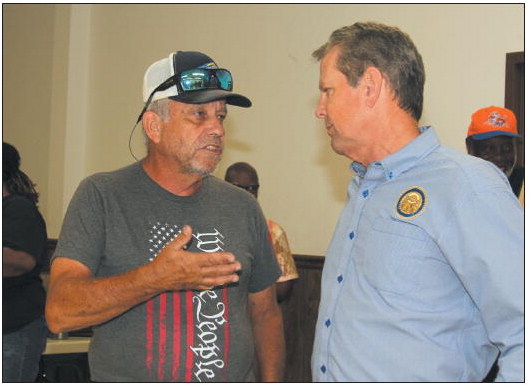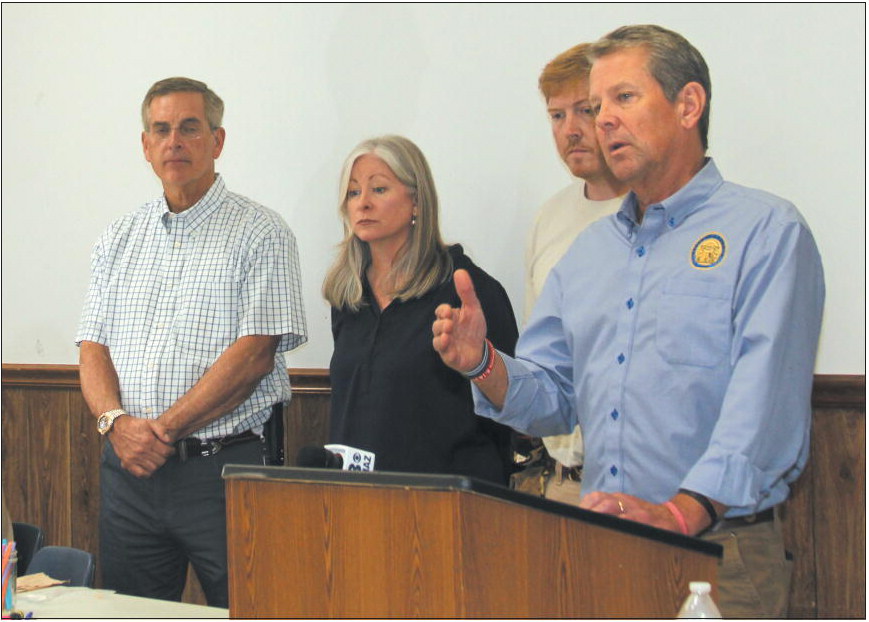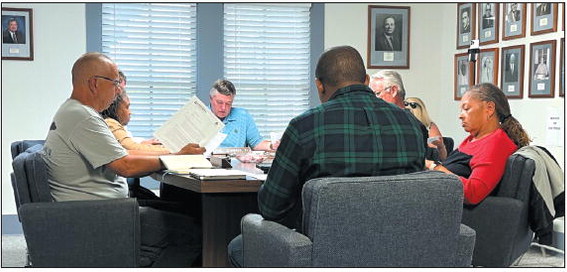Governor Kemp Surveys Hurricane Damage Across Southeast Georgia


Governor Brian Kemp and other state officials saw first-hand the impact of Hurricane Helene in Toombs, Montgomery and Wheeler counties Tuesday, October 1, as they visited areas in Southeast Georgia heavily impacted by the storm.
Packing winds estimated at 75 to 100 miles per hour, the storm ripped through Southeast Georgia after moving ashore in Florida’s Big Bend as a Category 4 hurricane on Thursday. The storm had lost some of its punch as it entered Georgia, but was still powerful and caused catastrophic damage as it moved north. Massive power outages left communities in the dark and without the ability to communicate. Many residents were trapped inside their homes and neighborhoods because of downed trees.
The Governor confirmed on Tuesday that at least 25 people in Georgia had lost their lives in the storm (this number later increased to 33), including two persons from Wheeler County who were killed when their mobile home was picked up by high winds and tossed into a field.
continued from page
Making a stop in Wheeler County Tuesday night, Governor Kemp and First Lady Marty Kemp greeted emergency responders and a team of volunteers who had set up a command post at the Community Center in Alamo. The Governor was accompanied by 12th District Congressman Rick Allen, Secretary of State Brad Raffensperger, GEMA Director Chris Stallings, as well as Sen. Blake Tillery of Vidalia and Rep. Lee sa Hagan of Lyons, who both represent sections of Southeast Georgia in the state legislature.
“Marty and I have been to half a dozen counties since Saturday (September 28). This storm spared no one as it moved out of Florida and into Geor- gia, down around Valdo sta, came through here and went all the way up to Augusta, went through South Carolina and North Carolina and into parts of Ten- nessee and Virginia. is storm was very mobile, and you know that first hand,” Governor Kemp said to the crowd assembled at the Community Center.
“Marty and I have heard incredible stories. One woman who was trapped in her car for three days before rescuers got her out. There has been a horrific loss of life. A 27-yearold mother and her twin boys died in McDuffie County when a tree fell on their home. We lost one of our finest, Assistant Fire Chief Leon Davis in Blackshear, as he was responding to a call. A seven-year-old boy and four-year-old girl died in Washington County, when a tree fell on their home and it caught on fire and they did not get out. We are going to Dublin tomorrow where a 58-yearold man was killed when a tree fell on his home.”
He said to the group in Alamo, “I know this community has felt this as hard as anyone else.” Addressing the first responders, he added, “I know you are tired, you are hot, its hard work, and it is frustrating, but just know, y’all are doing the Lord’s work. We see it, we hear it. We are so appreciative of what you are doing for the citizens of your community and our state.”
The Governor said he and his team have also been dealing with issues in the northern part of the state, including the metro-Atlanta area where rainfall set a 48-hour record that had not been topped since 1886. “Then it was 9.6 inches; for this storm we had 11.1 inches, so we have had massive flooding in the northern part of our state, with evacuations and damage to property.”
He continued, “Right now we have 1,400 of our finest National Guard citizen-soldiers serving all across the state, and I called up an additional 1,000 this morning. Now that we have roads cleared we can move pods (points of distribution) into areas and move bigger trucks in here. We have resources coming in the days ahead and we will continue to scale that up as needed.”
The governor added, “I know you probably heard this (Tuesday, October 1) morning that FEMA included 11 counties in an emergency declaration. We were frustrated with that, as were a lot of people in this area of the state. I spoke with the FEMA administrator and said, ‘Look, I know you are trying to get things done fast, but you are missing a lot of people down there. You have communities that are hard hit with fatalities and they feel like nobody is doing anything. They feel like they are forgotten and that is a problem. We have got to get that problem fixed.” He noted that over 30 additional counties were added soon after his conversation. “I feel like we are in much better shape.”
The governor also announced that he had just issued an executive order to suspend the fuel tax to lower the cost of gasoline and diesel fuel. “There’s a lot of people running generators to supply water and lights, so while we have a state emergency, we are going to take the tax off gasoline and diesel. That will probably save you 31 cents a gallon on gas and about 45 cents on diesel; and we are working on other things.”
Kemp also commented on the power outages. “There is severe damage on the transmission lines and some of those are being rebuilt. Our utility partners are making great progress. Yesterday (Monday, September 30) morning, Georgia Power had 15,000 people responding. Today (Tuesday, October 1) 20,000 people are working. Trucks are rolling in from other states to get power back on and to start redeploying those lines and resources in Southern parts of the state.”
One source reported that Helene impacted over 6 million customers in 10 states and over 50,000 workers from 41 states, the District of Columbia, and Canada are now working on power outages. Eight days after the storm, Georgia Power had restored power to more than 1.2 million of its customers, with more than 90% of all customers being impacted by what the company said is the most destructive hurricane in history.
“I urge patience. Georgia Power alone has 8,000 broken poles, over 21,000 spans of wire on the ground, which is about 700 miles of wire, 1,500 transformers have been damaged, about 3,000 trees are on power lines,” the Governor said.
He noted that the Georgia Department of Transportation reported that after the storm 140 state routes and interstates were blocked with debris. “Currently, we have those cleared, white line to white line. We will continue to clear roads to make travel safe for moving resources and for continuing to free up neighborhoods. There are literally tens of thousands of people working across the state, in over 90 Georgia counties which will probably be eligible for emergency declaration before this is over with. We are working hard to put the state back together and it is going to take a long time. I just want you to know we are thankful for how this community is coming together.”
The Governor said his office has been in communications with Georgia Agriculture Commissioner Tyler Harper regarding helping the state to recover agriculturally. “I saw pivots turned over in fields, whole pecan orchards torn up, and livestock losses,” the Governor said of his trek through the devastated counties. He said University of Georgia teams would be surveying damage and the USDA’s Farm Service Agency would be assisting in recovery. “Make sure you document your losses,” he advised those involved in agriculture.
GEMA Director Chris Stallings said last Tuesday, October 1, that damages from the hurricane were estimated at $326 million at that point. He noted that other states had reached out to help Georgia, including New Jersey and Missouri, which had sent generators, Maryland, which was helping with search and rescue, and Alabama, which had sent water and ice.
Initially, President Joe Biden issued a disaster declaration for 11 counties in Georgia: Brooks, Coffee, Columbia, Jefferson, Liberty, Lowndes, Pierce, Richmond, Tattnall and Toombs.
After Governor Kemp spoke with the FEMA Administrator and Biden’s Chief of Staff, advocating for more Georgia counties to be listed as disaster areas and approved for FEMA Individual Assistance, 30 additional counties were added and will qualify for relief. These include Atkinson, Bacon, Ben Hill, Berrien, Bulloch, Burke, Candler, Chatham, Clinch, Colquitt, Cook, Echols, Emanuel, Evans, Glascock, Irwin, Jeff Davis, Jenkins, Johnson, Lanier, Laurens, Lincoln, McDuffie, Montgomery, Screven, Telfair, Treutlen, Ware, Washington, and Wheeler. Eight additional counties were added later in the week. These are: Bryan, Butts, Camden, Charlton, Glynn, Long, Newton, and Wayne. As the Governor mentioned, additional counties may be added.
On Friday, October 4, officials from Wheeler County and its two municipalities held at joint session at City Hall in Alamo, where they adopted resolutions to apply for FEMA mutual aid to continue community cleanups. All three of the governing bodies adopted resolutions which contract Phillips & Jordan of Knoxville, Tennessee, to provide the service, augmented by DebrisTech of Picayune, Mississippi, which will document the cleanup for FEMA reimbursement. The teams will clear debris from all rights-of-way within the county and properly dispose of the debris collected.
Brian Smallwood, program manager for Phillips & Jordan, said his company employs 1,500 people who have extensive experience in helping communities recover from disasters. He said some of the biggest jobs his company has handled include the cleanup at the Twin Towers in New York City and the Hurricane Katrina disaster in Louisiana. He said his company has also contracted to provide cleanup in Hazlehurst.
The crews will address debris on the rights-of-way only, not inside private property. County residents will not have to request the service; the areas will be determined by survey teams who will cover the entire county.
In the next days and weeks, Wheeler County residents can visit a Facebook site to stay informed about supplies, recovery efforts, and news related to the community disaster, see Wheeler County Emergency Support on Facebook, or call 912-423-0919 for information, assistance, or to volunteer and/or donate.
Schools reopened in Wheeler County on Monday, but school officials are aware that all students may not be able to attend. Many homes are still without power. Buses will run and those students who are able to attend classes will be offered a comfortable, airconditioned environment and hot meals, as the community returns to more normal routines.
Helene is now the second deadliest hurricane to strike the United States mainland in the last 55 years, topped only by Katrina in 2005, and with the most fatalities since Camille in 1969. Over 230 people have been confirmed dead in six states, and the death toll grows daily as search and rescue continues, especially in North Carolina. Many people are still missing. Comparatively, Katrina was a Category 3 hurricane when it rolled into Louisiana, with 125 mph maximum winds and a wind field of 230 miles. Helene was a Category 4 storm when it moved into Florida, with maximum winds of 140 mph and a wind field of 370 miles. The swath of destruction that cut across the Southeastern United States was so massive that it was visible at night from outer space.
FEMA Assistance
FEMA will provide assistance for housing costs, food costs and other supplies. FEMA and FSA will be setting up centers throughout the area impacted by the storm where citizens may come to apply for assistance. For assistance or to ask questions, visit www.DisasterAssistance. gov or call the FEMA hotline at 800-621-3362. The FEMA app can be downloaded to your smartphone. FEMA asks that families, individuals, or businesses with insurance to file claims with their insurance companies as soon as possible.
By law, FEMA cannot provide benefits for losses that are covered by insurance; however, citizens may qualify for Individual Assistance even if they have insurance. Individual Assistance may include temporary housing while citizens are unable to live in their homes, or money to support the repair or replacement of owner-occupied homes that serve as the household’s primary residence.

GOVERNOR VISITS AREA – Governor Brian Kemp and First Lady Marty Kemp got a first-hand view of the damage caused by Hurricane Helene as they started visiting impacted counties on September 28. Above, on October 1, Governor Kemp addresses a crowd of citizens, officials and volunteers assembled at the Community Center in Alamo. Among the officials accompanying him were, from left: Secretary of State Brad Raffensperger, State Representative Leesa Hagan of Lyons, and State Senator Blake Tillery of Vidalia.Photo by Deborah Clark







